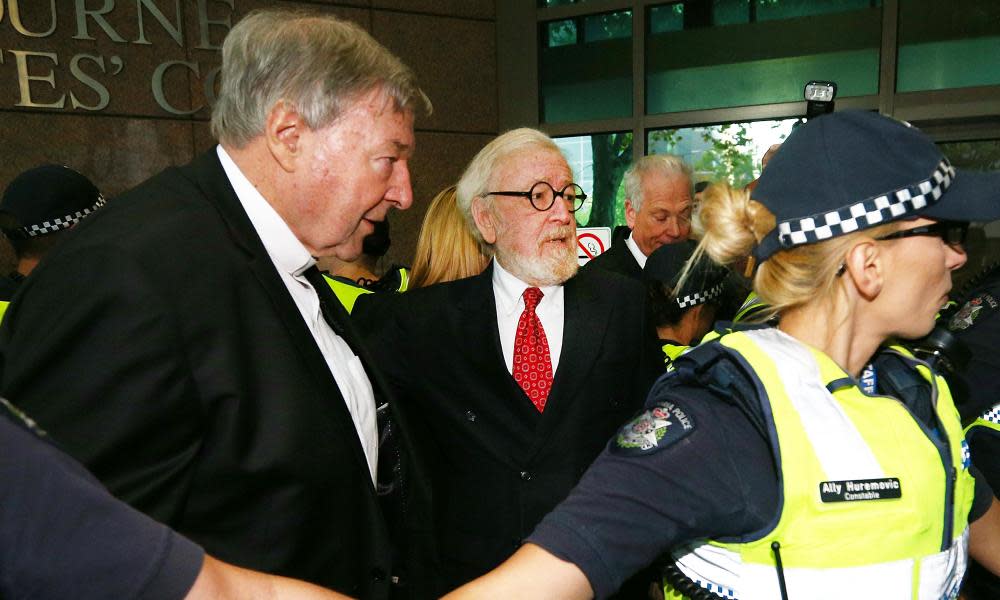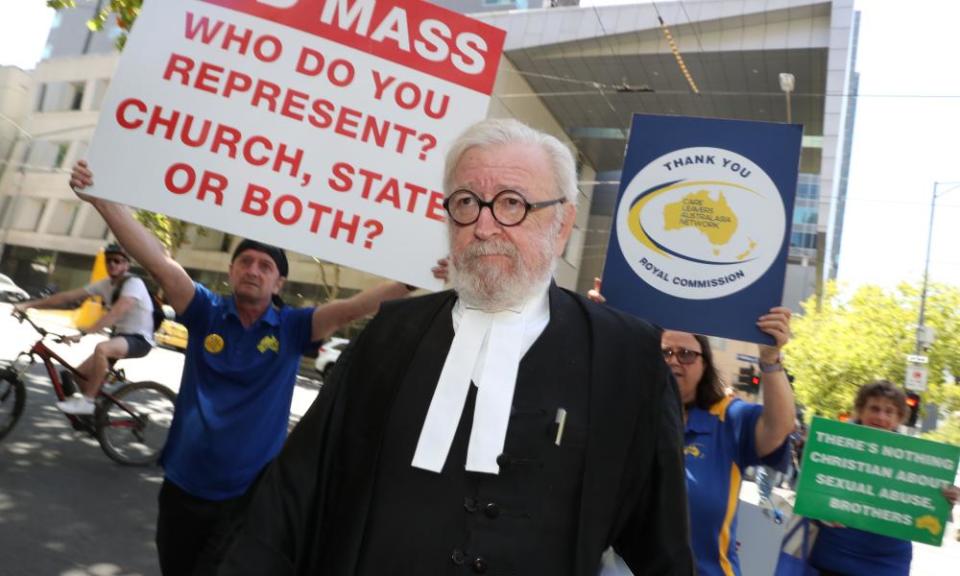Defending George Pell: 'I believe Pell's a good man'

In February 2020, I took the elevator to the fourth floor of a building in the heart of Melbourne’s courts district to interview Robert Richter, the defence barrister who represented George Pell at trial. He led me into his chambers, a room brimming with artwork, papers, books and vintage furniture. By the door was a 255-year-old leather chair made for Dr Samuel Johnson, who wrote the famous eponymous English dictionary. The relic has sentimental meaning for Richter, who taught himself English after moving with his family to Australia as a 13-year-old boy via Israel and the Soviet Union, where he was born.
I put in interview requests with the prosecution, including Mark Gibson, the county court’s chief justice, Peter Kidd, and Bret Walker SC, but Richter was the only one to eventually agree to be interviewed on the record about the case. While I was writing this book, many people I spoke to – including police officers, child-abuse researchers, lawyers and senior figures in Melbourne law – spoke of their respect and admiration for Richter. Some described him as kind; most described him as brilliant. However, none would go on the record, so poor are the optics of speaking favourably of someone representing an accused child-sex offender as high-profile as Pell.
I sat on a couch opposite Richter’s desk. Richter, contrary to the barrister’s black gown I’d become accustomed to seeing him in, was wearing a brown leather jacket. He leaned back into his leather office chair, sucked on his vape and told me that the reason Pell was convicted was “three years of royal commission shit”.
Related: Why George Pell walked free
“Shit about how he moved people around, and about how he turned up to court as a character witness when [the paedophile Gerald] Ridsdale was pleading guilty, when in reality, Pell just accompanied him to court.” Pell’s appearance before the royal commission had damaged his reputation and influenced people’s perceptions of him, Richter said. While the royal commission’s findings regarding Pell had not been made public at the time of our interview, the media coverage of Pell’s evidence, in which he “came across as wooden and doctrinaire”, had turned the public against him, Richter said. “There was three years of press that painted him as a monster.”
I asked Richter about the years of positive press that Pell received, including in the aftermath of the verdict. High-profile defenders of Pell wrote column after column defending him, despite never having spent a day in the court or having had time to access transcripts. Conservative news programs did the same. Wasn’t it disingenuous to suggest that the press influenced people against Pell, when reporters were merely reporting what he said at the royal commission, and when so many powerful media personalities defended him?

The difference, Richter said, was that those defending Pell got it right. He said that while he personally abhorred the politics of some of Pell’s defenders, they were correct in their assessment that the offending was impossible.
Pell, just a few years senior to Richter, was “quite delightful”, Richter said. The two had become friends, despite their stark differences in world views. It may seem that Richter, an atheist opposed to drug-prohibition laws and an advocate for civil liberties and human rights, would have little in common with Pell, an orthodox Catholic opposed to the rights of LGBTIQ couples to marry, an anti-abortionist and a defender of traditional values. In fact, Richter said that one of the reasons he pursued criminal defence after a short stint working in prosecutions was because he knew he could never feel comfortable prosecuting offences such as drug crimes and petty matters.
“I would never prosecute drug cases. There are cases I wouldn’t prosecute on a matter of principle, and if someone insisted I had to, my heart wouldn’t be in it. I had no objection to prosecuting things, except in cases when the law was a piece of shit.”
Though Pell’s and Richter’s views differed, it was a meeting of two minds, Richter said, and he enjoyed their conversations and Pell’s sense of humour.
“I always thought he was very well read. I mean, he’s got a PhD [in church history], for God’s sake. I believe Pell’s a good man. He’s very ambitious, and I think his ambition consumed him in the sense he saw things he wanted to do and had to do theologically, and pursued them rigorously.”
Richter said he never believed at any point that Pell was guilty of the allegations. So, when he was convicted, Richter felt “shattered”, especially because he had believed the case would never make it past the committal hearing. “I lost my cool after the conviction. I thought it was a perverse verdict.”
Richter fell into a depression. He began to withdraw. “It was horrible. It was different in this instance, as we had the first trial, which I thought we won hands down. The jury disagreed. So I thought, the second time around, the worst-case scenario would be another hung jury.
“So the conviction came to me as a complete shock. I felt neutered.”
Did he think the outcome might have been different if he had put Pell on the witness stand to face examination and cross-examination?
“I doubt it. Look, the assessment that we made – and we made it collectively with Pell – was there was no point in calling him to give evidence. He’d given an explanation on tape, a voluntary one. He gave his account to the detectives. And how does he prove a negative? Other than by saying, ‘I didn’t do it. It wasn’t me’? What else could he say if he was giving evidence? There was no point. To call someone against whom the evidence was as it was, to call them is almost to invite a jury to ask, ‘Who do you believe? The man who says “I didn’t do it”, or the man who says the opposite?’”

That was the wrong question for the jurors to be focused on, Richter said. “We didn’t need to prove it was impossible for the offending to occur. We just needed to prove there was a reasonable doubt as to whether it happened, and that’s what we needed the jury to focus on.”
Richter, who shows little sign of stopping at the age of 74, despite his family imploring him to slow down, said that after the verdict, “I was going to give it all away”. One of his colleagues and oldest friends calls Richter “snakeskin” – because when he is under stress, the skin begins to peel off his face.
He also fell into a deep depression. His stress and anxiety once again reared up. These are conditions that Richter does not shy away from disclosing when asked. “I seriously thought: I don’t think I can take this,” he recalls. After Pell’s sentencing, Richter tried to take a step back from work, contemplating whether it was all worth it after almost five decades.
Related: The legal trials of George Pell – timeline
“I thought about it for weeks. I tried not to work. And then, as time went on, I thought, ‘No, I’m not giving up. I have certain abilities and skills I don’t think should go to waste. I’m not ready to retire.’ There are certain cases that come up, and I thought if I could do anything to help, I should. When I run out of energy I want to reduce the workload and start advising more, on tactics and things of that nature. But, at the moment, I’m in full fighting mode. At my age, I can no longer work 48 hours nonstop, but I can still work until two or three in the morning.”
While Walker led the appeal, Richter focused on recovering, and then on offering his services pro bono to other cases. He also took on some smaller sexual assault trials, securing acquittals for his clients in each one. It restored his confidence.
“And that made me think: I just don’t know what to think about the jury in the Pell case,” he said. “As a barrister, I have to accept that juries get things right, by and large. But there’s a moral panic when it comes to sexual abuse that requires people to assume that because someone claims to be a victim you treat them as a victim, as though that’s all that’s required as proof to begin with.”
When the court of appeal upheld the verdict, it was another blow to Richter, but when I interviewed him he felt resigned about letting the process play out, and he seemed hopeful.
“I also have to accept, as does the high court, that every now and again the jury will get something wrong, and they’ll get it wrong in a way that results in a court quashing a conviction. I’ve committed too much time and effort to this one to allow myself to think at this stage we will lose.”
Asked if he would run the trial differently if he could do it all again, Richter said vehemently: “No.”
On 7 April this year George Pell was freed from jail immediately after the high court’s decision that his appeal should be upheld, as there was “a significant possibility that an innocent person has been convicted”.
This is an edited extract from The Case of George Pell: Reckoning with Child Sexual Abuse by Clergy, by Melissa Davey (Scribe, $35), out today

 Yahoo News
Yahoo News 
